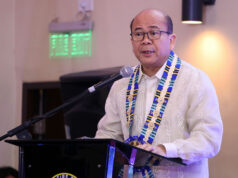PNP, PDEA also flag links between drugs, human rights
By Arjay L. Balinbin
THE Philippine National Police (PNP) and the Philippine Drug Enforcement Agency (PDEA) are investigating the alleged links between human rights organizations and drug syndicates, officials of those agencies said in a briefing at Malacañang on Tuesday.
“That is subject to further investigation by all law enforcement agencies. But seeing the trend of how they attack the anti-drug campaign, I guess we can only surmise that it might be unwitting to the human rights groups that they are being capitalized or made as leverage by drug groups,” PDEA Spokesperson Derrick Arnold Carreon said at the #RealNumbersPH media briefing at Malacañang on Tuesday, March 27.
For his part, PNP Spokesperson Chief Superintendent John C. Bulalacao said his agency is “validating” reports that human rights groups are being used by drug syndicates to “discredit the efforts of the government against drug trafficking.”
The said reports are a “recent finding,” Mr. Carreon for his part said, adding that PDEA is “cooperating closely” with the PNP and related agencies.
Presidential Spokesperson Herminio Harry L. Roque, Jr. and Foreign Affairs Secretary Alan Peter S. Cayetano have previously issued statements claiming that “some human rights groups have become unwitting tools of drug lords to hinder the strides made by the administration.”
Such allegations, according to Human Rights Watch (HRW) deputy director Phelim Kine, “are more than just gratuitous slurs aimed at undermining the integrity of already beleaguered Philippine human rights activists pushing back against the Duterte government’s systematic attack on rule of law and its instigation and incitement of possible crimes against humanity.”
“Publicly linking human rights groups with ‘drug lords’ constitutes a sinister veiled threat in a country in which government-compiled ‘watch lists’ of suspected drug users and drug dealers have been linked to many of the ‘drug wars’ thousands of victims. This is a familiar government tactic,” Mr. Kine added.
On Tuesday, Mr. Roque said he stood by his earlier remarks. “Such scenario, we reiterate, should not be discounted given the billion-peso losses of the drug lords.”
“Human Rights Watch (HRW) should therefore not feel alluded to, exaggerate and politicize the issue to get some media mileage and public attention,” he added.
For his part, Bayan Muna Party-list Representative Carlos Isagani T. Zarate said: “That is a very dangerous statement. It [puts] the lives ng ating (of our) human rights advocates in grave danger. Ang dami nang namamatay dahil lang sila’y napagkakamalan (Many have died already for being wrongly accused). Fake news ang sinasabi nilang pinopondohan ng drug lords ang human rights advocates (Saying that human rights advocates are being funded by drug lords is fake news).”
“Iresponsable ang statement na ’yan ni Harry Roque, who, tragically, galing pa naman dati sa human rights community (Harry Roque’s statement is irresponsible, [and] tragically, [he] came from the human rights community),” Mr. Zarate noted.
In its statement, the opposition Liberal Party quoted its vice-president, former congressman Lorenzo R. Tanada III, as saying: “The plot gets crazier by the day.”
“We also see the statement as an attempt to taint and damage the efforts of human rights groups, who have been courageous and untiring in monitoring the implementation of the government’s anti-drug efforts and the abuses that go with them,” he added. — with Minde Nyl R. dela Cruz



